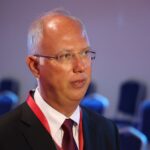The Central Election Commission of Georgia (CEC) has modernized the country’s electoral process by introducing high end technologies that ensure efficiency, transparency, and security. The institution has made it a priority to integrate digital solutions in partnership with international companies such as Smartmatic. The CEC has adopted practices that meet international standards, while safeguarding voter information, improving accessibility, as well as ensuring public confidence. GEORGIA TODAY interviews Giorgi Kalandarishvili about the latest technological advancements, their expected impact on elections, and the future plans and goals for the CEC.
Kalandarishvili explains that “the CEC has adopted a new approach in election technology, which prioritizes transparency and efficiency.” “During the selection process, reliability, data security, comfort for voters and easy adaptability to our electoral framework were all priorities.
“In accordance with international best practices, and recent amendments to Election Code, we’ve been conducting extensive testing since 2018. These pilot programs were based on analyses of international standards, and covered both ordinary and general elections. This allowed us to fine-tune our implementation process.
“Our partnership, with the internationally renowned vendor Smartmatic, chosen through a public tender, ensured that we were able to integrate proven technology.” Smartmatic, for example, has extensive experience modernizing elections in more than 30 countries,” he says, noting that CEC prioritized technology that does not require an Internet connection to safeguard against possible manipulation or cyberattacks.
“By focusing our attention on these elements, it was possible to ensure that decisions were based not only on the best practices of international organizations, but that they also went through extensive trials that ultimately led to multiparty agreements and legislative change.”
How has technology improved the electoral process?
The implementation of electronic voting and voter verification technologies has greatly improved the efficiency of the electoral process. These services will benefit nearly 90% of voters, as they simplify voting procedures, reduce errors, and speed up the counting and generation of preliminary data. The inclusion of a paper record and mandatory recounts will ensure the accuracy of machine counts. This will further strengthen transparency. In the remaining 10% of polling stations traditional voting will still be used. However, ballot papers will now be digitized, uploaded to Google, and made available to the public. This will improve trust and ensure full transparency. The system’s reliability has been validated by the consistent results of previous elections.
What steps does the CEC undertake to ensure maximum protection of data?
The CEC places the highest priority on the confidentiality of voters. We conduct regular audits, even though they are not required by law, to ensure the integrity and transparency of our systems. Pro V&V is one of only two US-accredited firms that we have engaged to perform a three stage audit of our voting technologies. Our systems are not Internet-based, so the risk of cyberattacks has been significantly reduced. This further protects the election process. This comprehensive approach ensures voter data is protected securely while maintaining public confidence.
Is the voting process simplified for Georgians living abroad?
Georgian citizens abroad will be able to participate in the elections through traditional means. We ensured that information about election procedures and deadlines was distributed to overseas voters in close coordination with the Ministry of Foreign Affairs. We initially established 60 sites for voting in 53 cities spread across 42 countries. We added seven additional locations due to the increasing number of registered voters. While electronic voting is not available to overseas voters, we have ensured that all logistical aspects and organizational aspects of the election are well coordinated, promoting maximum participation among Georgian citizens abroad.
How do voters get verified?
A double-checking process is used to verify the voter. The voter must first present an ID or passport to verify their identity. The system prints a receipt that the voter signs as confirmation of participation. This eliminates the possibility of manipulation by ensuring that each voter is only allowed to vote once. The verification system has been subjected to extensive audits that confirm a voter can only be listed once. This further safeguards the process.
How can you maximize public trust by ensuring transparency?
Transparency is an important principle in the electoral process. We have created multiple platforms to engage the civil society, media, and international organisations, creating an openness regarding the election process. Regular meetings, information sharing, and consultations allowed us to incorporate feedback into our systems. To promote transparency, we launched an educational campaign around a year-and-a-half ago. We engaged over 600,000 people through mock voting events and outreach initiatives. Our efforts to combat misinformation ensure that the public is provided with accurate information and contribute to a fair and transparent election environment.
Tell us about your future plans for the CEC.
Our primary goal is to continue expanding online services in order to strengthen election security, efficiency and inclusivity. We are committed in exploring innovative solutions to elevate the electoral process while adhering to international standards and promoting transparency.
Interview by Mariam Razmadze
Read More @ georgiatoday.ge













